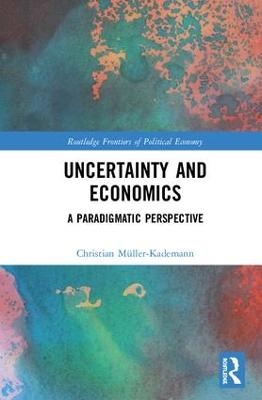
Uncertainty and Economics
A Paradigmatic Perspective
Seiten
2019
Routledge (Verlag)
978-0-367-07603-0 (ISBN)
Routledge (Verlag)
978-0-367-07603-0 (ISBN)
It is argued that radical uncertainty is a powerful concept for economic analysis and applies it to standard economic topics such as institutions, money, the Lucas critique, fiscal policy and asset pricing. The book also offers policy conclusions and recommendations for further theoretical and applied research.
This book is set against the assumption that humans' unique feature is their infinite creativity, their ability to reflect on their deeds and to control their actions. These skills give rise to genuine uncertainty in society and hence in the economy. Here, the author sets out that uncertainty must take centre stage in all analyses of human decision making and therefore in economics.
Uncertainty and Economics carefully defines a taxonomy of uncertainty and argues that it is only uncertainty in its most radical form which matters to economics. It shows that uncertainty is a powerful concept that not only helps to resolve long-standing economic puzzles but also unveils serious contradictions within current, popular economic approaches. It argues that neoclassical, real business cycle, or new-Keynesian economics must be understood as only one way to circumvent the analytical challenges posed by uncertainty. Instead, embracing uncertainty offers a new analytical paradigm which, in this book, is applied to standard economic topics such as institutions, money, the Lucas critique, fiscal policy and asset pricing.
Through applying a concise uncertainty paradigm, the book sheds new light on human decision making at large. Offering policy conclusions and recommendations for further theoretical and applied research, it will be of great interest to postgraduate students, academics and policy makers.
This book is set against the assumption that humans' unique feature is their infinite creativity, their ability to reflect on their deeds and to control their actions. These skills give rise to genuine uncertainty in society and hence in the economy. Here, the author sets out that uncertainty must take centre stage in all analyses of human decision making and therefore in economics.
Uncertainty and Economics carefully defines a taxonomy of uncertainty and argues that it is only uncertainty in its most radical form which matters to economics. It shows that uncertainty is a powerful concept that not only helps to resolve long-standing economic puzzles but also unveils serious contradictions within current, popular economic approaches. It argues that neoclassical, real business cycle, or new-Keynesian economics must be understood as only one way to circumvent the analytical challenges posed by uncertainty. Instead, embracing uncertainty offers a new analytical paradigm which, in this book, is applied to standard economic topics such as institutions, money, the Lucas critique, fiscal policy and asset pricing.
Through applying a concise uncertainty paradigm, the book sheds new light on human decision making at large. Offering policy conclusions and recommendations for further theoretical and applied research, it will be of great interest to postgraduate students, academics and policy makers.
Christian Müller-Kademann is Privatdozent of Economics at Jacobs University in Bremen, Germany. He received his first degree from Hull University, UK before graduating from Humboldt University, Berlin with a diploma in economics, after which he began his PhD in economics and econometrics.
Preface.
Acknowledgements.
Introduction.
1. What's uncertainty, after all?
2. Uncertainty in economics.
3. Uncertainty in the economy.
4. The empirics of uncertainty.
5. Conclusion.
Bibliography.
Index.
| Erscheinungsdatum | 18.01.2019 |
|---|---|
| Reihe/Serie | Routledge Frontiers of Political Economy |
| Zusatzinfo | 4 Tables, black and white; 16 Line drawings, black and white; 16 Illustrations, black and white |
| Verlagsort | London |
| Sprache | englisch |
| Maße | 156 x 234 mm |
| Gewicht | 340 g |
| Themenwelt | Geschichte ► Teilgebiete der Geschichte ► Wirtschaftsgeschichte |
| Geisteswissenschaften ► Philosophie | |
| Wirtschaft ► Allgemeines / Lexika | |
| Wirtschaft ► Volkswirtschaftslehre ► Makroökonomie | |
| Wirtschaft ► Volkswirtschaftslehre ► Wirtschaftspolitik | |
| ISBN-10 | 0-367-07603-9 / 0367076039 |
| ISBN-13 | 978-0-367-07603-0 / 9780367076030 |
| Zustand | Neuware |
| Informationen gemäß Produktsicherheitsverordnung (GPSR) | |
| Haben Sie eine Frage zum Produkt? |
Mehr entdecken
aus dem Bereich
aus dem Bereich
Macht und Herrschaft im Zarenreich
Buch | Hardcover (2024)
C.H.Beck (Verlag)
49,90 €
wie die USA und China um die technologische Vorherrschaft auf der …
Buch | Hardcover (2023)
Rowohlt (Verlag)
30,00 €


